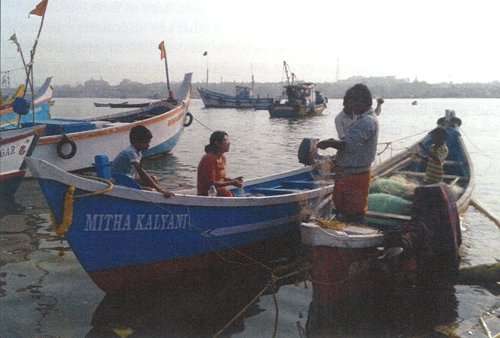Broader research perspective unveils more about changing life opportunities in urban fisheries

As cities grow, the traditional lifestyle for small-scale fishing can be threatened, while at the same time cities create development opportunities. Using a wider analytical perspective, researchers can disclose a more diverse picture of development opportunities, threats, and conflicts for small scale fisheries than researches commonly do. This is shown a new dissertation from Gothenburg University.
Studies of small-scale fisheries often focus narrowly on marine-based resources, and in rural areas. In her thesis, Alin Kadfak shifts the perspectives. She has been looking at fisheries in an urban area. And analytically she has focused on coastal spaces in a broad sense rather than marine-based resources solely. This has resulted in a comprehensive understanding of different transformation processes and how changing life opportunities plays out in an urban fisher's community in the global south.
"Fisheries-related livelihoods require not only a sustainable fish yield and a well-defined fishing territory. It also depends on e.g. land-based resources like processing facilities, market, and transport infrastructure", Alin Kadfak says.
For her study in environmental social science Alin Kadfak has spent eight months of field work in Tota-Bengre, a small fisher's village close to the middle-size but fast-growing city Mangaluru in South-West India. With her shifted analytical focus, she found among other things that the growing neighbouring city both threatens the fishermen's traditional way of life and provides opportunities for development.
"For instance, many of the fishermen today have shares in large-scale fisher boats", she says. "And the closeness to the city also brings job opportunities ashore".
On the other hand, claims of land that stems from the growing city and the development of more large-scale fisheries, also means that traditional fish dryers loose out.
"They have less land for their business and the construction of a new harbour means obstacles for them in their contact with the dry fisheries area", Alin Kadfak says.
As the dry fishers are mostly women, contrary to large scale fishers, land government also becomes a gender issue.
"There are layers of different conflicts, which an analytical approach such as the one I have used can detect and explain", Alin Kadfak says.
"The thesis shows how fishermen in the outskirts of the city can compete, negotiate and react on changing livelihood opportunities in many new and different ways", she says.
More information: The thesis can be found at: hdl.handle.net/2077/55053
Provided by Swedish Research Council

















